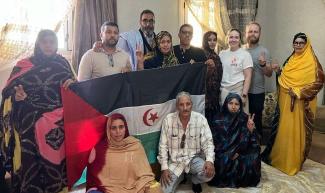
El Aaiun (Saharawi occupied territories) 4 November 2024 (SPS)- In a rapidly escalating series of incidents, Moroccan authorities deported two more Norwegian activists from the occupied territory of Western Sahara this afternoon.
Maja Rønningsbakk, 26, and Kevin Fossnes, 27, were detained and forcibly expelled on Monday afternoon after meeting with Sahrawi human rights defenders in the occupied city of El Aaiun.
This new incident follows the forced deportation of two other Norwegian citizens just a day earlier under similar circumstances, highlighting the tension surrounding Morocco's renewable energy initiatives in the occupied region.
Rønningsbakk and Fossnes, representatives of the Norwegian trade union youth committee Styrke, traveled to Western Sahara to gain insights into Morocco’s controversial green energy projects in the area.
The projects, led by companies such as Siemens Gamesa, are part of Morocco’s push to develop wind and solar energy infrastructure in Western Sahara, a country still considered by the United Nations as Africa’s last colony pending a decolonization process. The projects have drawn international criticism for undermining the Sahrawi people's right to self-determination.
The two Norwegian activists arrived at the home of human rights activists Mina Baali and her Husband activist, Hasanna Douihi, around 1:45 p.m., hoping to hear firsthand from Sahrawi citizens affected by the energy developments and related illegal exploitation of Saharawi natural resources by Morocco and some other European companies implicated in the plunder.
However, Moroccan police quickly surrounded the residence, with 34 officers stationed outside as evidenced by a video recorded by the Saharawi activists and published on the page of the Norwegian Support Committee for Western Sahara, which is documenting the deportations.
In the footage, Baali, the homeowner, defended her right to host the Norwegian visitors, stating that they had entered Western Sahara legally through the Checkpoints and therefore rejecting Moroccan officials attempt to claim they were illegally visiting the occupied territory.
The Moroccan deputy governor, however, ordered the activists to leave, declaring their presence illegal. Baali and other residents challenged the authorities, asking them to present legal documents justifying their actions. Despite the locals’ resistance, the authorities proceeded with the deportation.
By 3:00 p.m., Rønningsbakk and Fossnes were seen being escorted out of the home by Moroccan police and were placed in a waiting car for deportation. The video of the incident, circulated by the Norwegian Support Committee for Western Sahara, captured moments of the tense exchange between Sahrawi residents and Moroccan officials.
This incident follows the forced expulsion on Saturday of two other Norwegian nationals, Ingeborg Sævik Heltne and Vivian Kaulen Nedenes, who were also in Western Sahara to investigate the impact of Morocco’s renewable energy projects.
Heltne, a researcher with the Norwegian Council for Africa, reported that the police confiscated their passports, searched their phones, and ordered them to leave Western Sahara within hours of their arrival. Both women had been under police surveillance since entering the territory, according to Heltne.
The recent deportations underscore growing international concern over Morocco’s approach to Western Sahara’s resources.
Critics argue that Morocco’s energy projects, backed by international companies and bilateral agreements, exploit the region's resources without the consent of the Sahrawi people and their legitimate representative, Polisario Front.
The European Court of Justice recently ruled that EU trade agreements with Morocco cannot be applied to Western Sahara without the consent of the Sahrawi people, emphasizing the importance of their right to self-determination.
Heltne, reflecting on her expulsion, warned that Morocco’s crackdown on foreign observers signals a disregard for international legal norms.
“As long as the Sahrawis cannot express themselves about Morocco's climate projects, serious alarm bells should ring for states and companies. Not only is it wrong to support occupation, but agreements with Morocco are also on shaky legal ground if the Sahrawis' right to self-determination is not respected,” she said.
The incident has drawn sharp criticism from human rights organizations and sparked renewed calls for international monitoring of the human rights situation in Western Sahara, where foreign observers face restrictions and deportation, while Saharawi activists face even more serious retaliation and reprisal. (SPS)
090/500/60 (SPS)
To read the full story published on the Norwegian Committee of Support to Western Sahara visit its page in the link here: